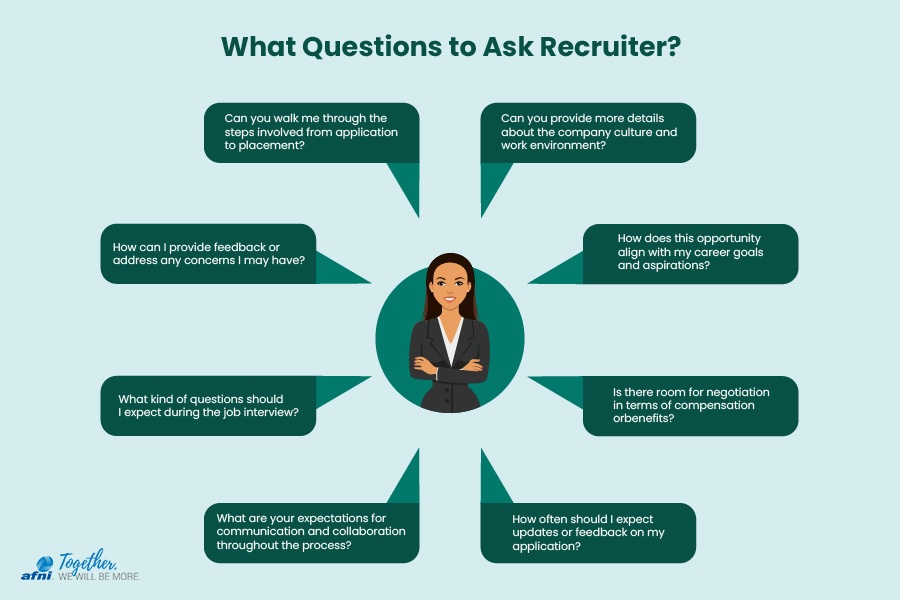
Afni News
Browse the latest news from Afni.
What Questions to Ask Recruiter?
February 27, 2024 inWhen it comes to the job hunt to secure their dream career, many tend to focus on the job interview and forget that the recruitment process is as important. Knowing what questions to ask recruiter during the screening interview is an excellent way to leave a positive impression.
Asking the recruiter relevant questions will allow you to learn more about the company and whether it fits your career goals. Recruiters gauge your skills and experience to ensure they bring only top talent to their company.
As a leading job hunt platform for career-oriented professionals, at Afni, our recruiters appreciate when interviewees ask questions that make them stand out. Let’s see what to ask recruiters during interviews!
What Questions to Ask Recruiter?
Recruiters are experts in finding, screening, and attracting ambitious professionals to open positions in their industry. A talent recruiter specialist is your initial point of contact with the organization where you want to work.
As recruiters oversee talent acquisition, they ensure the candidates have the necessary skills and experience. A recruiter does this during the introductory interview with a candidate.
The introductory interview is also called screening or phone screen and tends to be relatively short. Most often it lasts about 20-30 minutes. During the screening, you can ask for vital information regarding the job position and the company.
So, we outlined some useful questions to ask a recruiter in an informational interview. They may help you leave a good impression on the recruiter and learn more about the company.

Can you walk me through the steps involved from application to placement?
This is a good question for a recruiter to gather information about the further interview process. The recruiter can provide you with more details about the next steps of the hiring process.
The recruiter may also tell you how long you may be contacted for a following interview with the company. Plus, ask them how many interviews the company they recruit for typically does during the employment process.
You can determine if the process suits your needs by getting a general timeline. If the hiring process lasts several months but you are looking for a job you can start as soon as possible, this will be vital information for you.
Can you provide more details about the company culture and work environment?
Organizations have different company cultures, so this is a good question for a recruiter. You can find information from the job listing, but the recruiter can provide a clearer picture of what working for the company looks like.
This should help you gauge if the company culture is compatible with your needs and vice versa. See if the company has a dress code requirement or a looser policy on how employees dress.
Also, you can discover from the recruiter if there are any staff get-togethers or team-building activities and how often. You should listen closely to how the recruiter describes the company to see if you are a good match.
How does this opportunity align with my career goals and aspirations?
You will learn about the job’s requirements and qualifications from the listing. Yet, the recruiter can provide you with more details on the role. You can ask the recruiter what the role priorities are and if they will help you further your career aspirations.
This will show them that you are ambitious and dedicated to growing with the company. You can inquire about the potential growth you may expect in a given time frame, like after six months or a year. This is critical to understand if you want to develop a lengthy career in that particular sector.
Is there room for negotiation in terms of compensation or benefits?
The informational interview with a recruiter may also be a good time to discuss the compensation expectations. The recruiter may even ask you before you do about your salary expectations. This is because most companies have a budget range for each position.
You should research ahead of time what the general salary range of the role is based on location and experience. You may provide the range if the recruiter asks for your expectations.
If the compensation the company offers is within the same range, you may negotiate based on your experience and skills. Also, don’t forget to inquire if any benefits come with the position, such as bonuses, paid time off, and insurance.
How often should I expect updates or feedback on my application?
It is important to ask the recruiter during the informational interview how soon you may expect to hear back from the company. The recruiter should be able to estimate the response time, which will help you manage your expectations.
You can ask them if they provide updates and how often they do on the next interview steps. Another helpful thing to ask the recruiters is for feedback on your application.
The recruiter may tell you the strong points of your application and the weak ones. This can help you improve your weak points and emphasize your strengths.
What are your expectations for communication and collaboration throughout the process?
You should ask the recruiter if and how you should keep communication open throughout the process. Showing eagerness and willingness for collaboration during the interviewing process demonstrates to them your dedication and ambition.
What kind of questions should I expect during the job interview?
You can also ask about the questions you may expect during your following interview with the company. The recruiter can often offer specific examples to help you prepare for your interview.
This will also help you find out more about the hiring manager. Based on the example questions, you can gauge whether the hiring manager is laid back or has a more formal approach to job interviews.
How can I provide feedback or address any concerns I may have?
As a last question during the informational interview, ask how you can continue communication and provide feedback. The recruiter should be able to provide you with a way to address potential concerns that you may have.
Usually, communication during the process is continued through email. This way, you can ask more questions after the recruitment interview. Even if you do not have any concerns that need addressing after the interview, keeping the communication open is pivotal.
It is a good idea to send the recruiter a thank you email post-interview. This will show them your gratitude and serve as a strategic tool to help you stand out. You can reiterate your qualifications and skills, leaving a lasting impression on them.

Start Your Dream Job Hunt With Afni Today!
Learning what questions to ask recruiter during your informational interview can help you prepare for the next step in the process. Keep in mind the questions we provided here for your next interview.
At Afni, we believe in providing our employees with the best opportunities to advance in their careers. So, contact our team today and find your dream job!
About the Author
Samantha is the Recruitment Marketing Manager for Afni and brings a wealth of knowledge and tips for job seekers. She holds a bachelor's degree in public relations and marketing from Mount Saint Vincent University as well as a masters degree in digital marketing and advertising from Liberty University.

